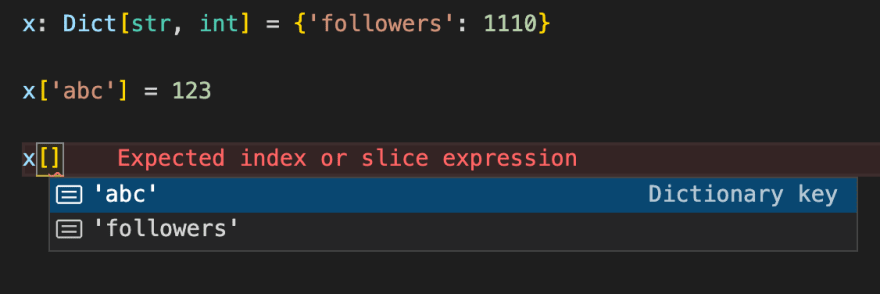40
You are coding the wrong way in Python if you aren't using these two libraries

Table of Contents
- Variables
- Lists
- Dictionary
- Functions
- Classes
What makes people love (sometimes hate 😛) TypeScript more than JavaScript?
It's the typing, the type safety. They know that there will be a safety net beneath them that catches many bugs and shouts at us if we do mistakes.
It's not just that it's the auto-suggestion that matters too, it would feel amazing right when you get the best auto completes and the methods for the variable.
Now what if I say we can you could kinda get it in python. It feels great right.

Now since we know python is an interpreted language and it doesn't have complier for itself so we can't entirely replicate typescript but at least try to use types wherever possible.
TL;DR on how typescript works, it takes the entire entire script code complies it into a JavaScript file, the complier does all the type checking.
Python is a dynamically typed language
From python 3.5 we have this amazing library which is build inside python, it's the
typing library. We can't cover entire library but applying Pareto principle (80-20 rule) I will try to cover a few important parts of the library.We use it along with a power type checking library
mypy.We will be sliding over the following topics in brief

Let's start
IDE Setup
Please install the following extensions for VSCode
int_typed:int = 4
float_typed:float = 1.2
string_typed:str = "hello"Let us see what happens if we try to assign them a different value.

To know more about Lists you have to know about
Sequence Sequence
In Python, sequence is the generic term for an ordered set. There are several types of sequences in Python, the following three are the most important.
Lists
Lists are the most versatile sequence type. The elements of a list can be any object, and lists are mutable - they can be changed. Elements can be reassigned or removed, and new elements can be inserted.
from typing import List
int_typed_list:List[int] = []
But but but but in
TypeScript we have any keyword if we want dynamic arrayYes the golden
Any even exists here toofrom typing import Any, List
int_typed:int = 4
float_typed:float = 1.2
string_typed:str = "hello"
int_typed_list:List[int] = []
int_typed_list.append(int_typed)
any_typed_list: List[Any] = []
any_typed_list.append(int_typed)
any_typed_list.append(string_typed)
any_typed_list.append(float_typed)
any_typed_list.append(int_typed_list)
For this section Picture speaks louder than words
from typing import Dict
x: Dict[str, int] = {'followers': 1110}
x['abc'] = 123
x.keys()
x.values()


My all time favourite definition of function is depicted in the picture below.

def get_avg(num1:int, num2:int) -> float:
return (num1+num2)/2
get_avg(12,9)
We may need a solution when we require custom classes to hold and use our data. Then we could similar to this
import math as m
class Vector:
def __init__(self, x:float,y:float) -> None:
self.x = x
self.y = y
def calculate_magnitude(self) -> float:
return m.sqrt(m.pow(self.x,2)+ m.pow(self.y,2))
v = Vector(1,1)
You get the beautiful autocomplete again with details 💫

As said in the picture, with great power comes great responsibility.
Python dynamic types gives us very easy to get started with learning python but at the same time increases the chances to create bugs unintentionally.
Python dynamic types gives us very easy to get started with learning python but at the same time increases the chances to create bugs unintentionally.
The typing gets even better in Python 3.9 and I hope it gets better and better as we progress.
Small changes can great a huge impact in the code, so please start using types, MyPy and feel safe.
I kept it brief but please do let me know if diving deeper helps, feedback is really appreciated.
P.S My Twitter DMs are always open if you want to discuss collaboration opportunities or request on writing for a topic

Thanks
Rohith Gilla
Rohith Gilla
40
